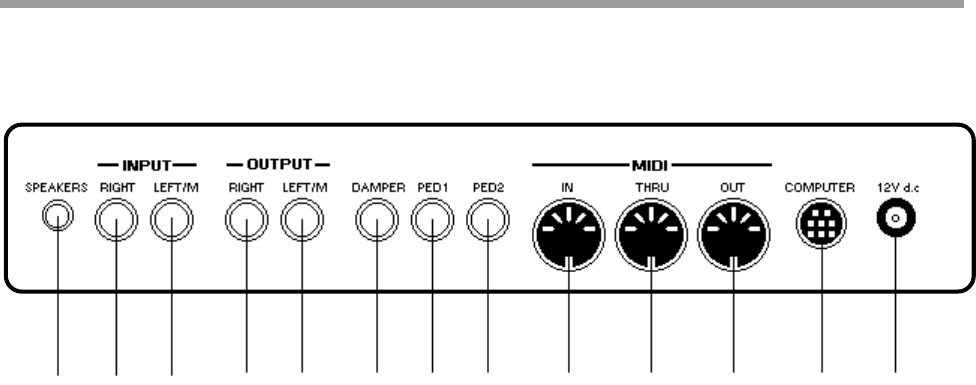
Generalmusic PRO 1/PRO 2 Page 6
Rear panel - PRO 1 / PRO 2
(1) (2) (3) (4) (5) (6) (7) (8) (9) (10) (11) (12) (13)
(1) SPEAKER JACK This jack allows you to connect a pair of multimedia monitor speakers for practice.
This output offers a small amount of power to drive the speakers at a low level.
(2) RIGHT INPUT
(3) LEFT /MONO INPUT You can use these inputs to connect another instrument or sound module to the piano.
The output of the other instrument will be mixed with the main signal of the piano
and sent to the OUTPUT, SPEAKER and HEADPHONE jacks. If you are connecting
a mono signal, (e.g. a microphone) then you should use only the Left/Mono connector.
(4) RIGHT OUTPUT
(5) LEFT/MONO OUTPUT These outputs are used to connect the instrument to an amplifier, mixer or recording
device in stereo. If you are connecting to mono equipment, (e.g. a guitar amplifier)
then you should use only the Left/Mono connector.
(6) DAMPER You can connect either a standard footswitch or the special Real Piano Continuous
Damper Pedal, (available from your Generalmusic dealer) to simulate the right pedal
of a piano.
(7) PEDAL 1 Each socket can accept either a footswitch or a continuous, (volume) type pedal.
(8) PEDAL 2 The function for each pedal can be selected in the PERF EDIT section.
(9) MIDI IN Allows the sounds of the PRO1/2 to be played by an external device e.g. a controller
keyboard or a sequencer.
(10) MIDI THRU Provides a copy of the information being received by the MIDI IN. Use MIDI THRU
when connecting a number of different instruments together.
(11) MIDI OUT Sends MIDI information from the PRO 1/2 to other equipment so that the instrument
can be used as a controller.
(12) COMPUTER JACK Allows direct connection of the instrument to an IBM or Macintosh computer without
the need to use a MIDI interface.
(13) D.C. POWER JACK Connection for the power supply unit. Use only the unit supplied with your instrument.


















